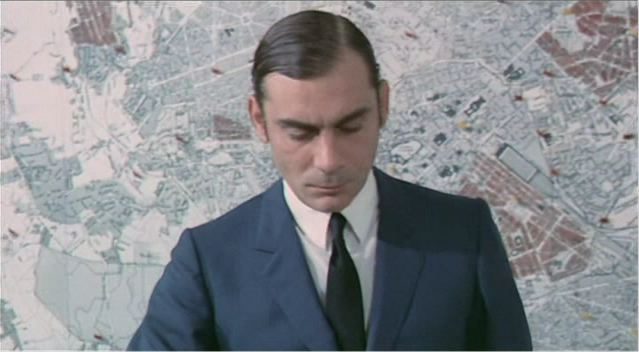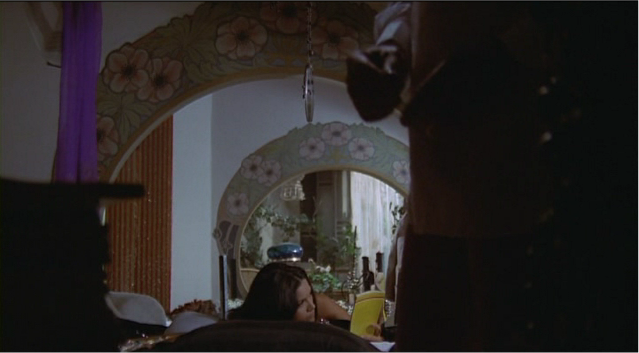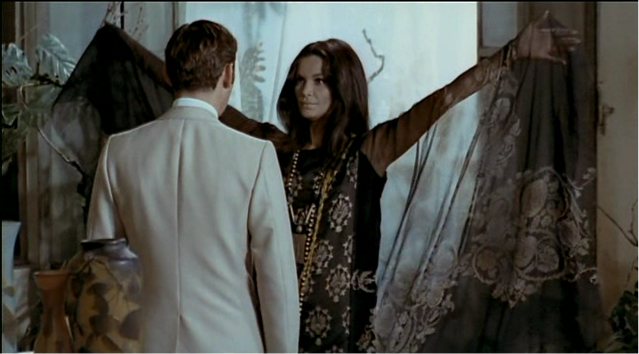
Based on its title, and a one-line synopsis in Halliwell's Film Guide, this movie (Investigation of a Citizen Above Suspicion, Elio Petri, 1970), had long been a movie I'd wanted to see. Observe:
"A successful police inspector kills his mistress and, paranoiacally considering himself to be above suspicion, plants clues leading to himself and even [spoiler deleted]."

The fact that Leslie Halliwell seemed only mildly impressed by the film didn't put me off: the fact that he saw any virtue in a movie made after 1960 strongly suggested that this was a triumph. Often, the value of a movie could be judged by how much it annoyed Mr. Halliwell.
Director Elio Petri is probably best-known for directing The Tenth Victim, a pop-art sci-fi classic which anticipates the murderous horrors of reality TV and gave us the original bullet-bra fembots who later plagued Austin Powers, but the man was a lot more than a merchant of slick kitsch. The Tenth Victim wears its politics lightly, but they're always there, and in many of his movies (always superbly titled: We Still Kill the Old Way, Property is No Longer Theft, The Working Class Goes to Heaven) it assumes a front-and-centre position. Here, it shares space with a psychological profile of a personality disorder, itself analyzed as an inevitable result of the social structure. The psychoanalytic/political mesh makes this film a close sibling of Bertolucci's The Conformist, and in fact the visual styles of the two films often seem to be converging. Both movies were released the same year, so it seems like a case of reality and cinema history pushing the same sets of buttons in two sympathetic auteurs.
As with the Bertolucci, Petri's film benefits from an insanely effective central performance, in this case provided by Gian Maria Volonte, who plays the unnamed Il Dottore, a former head of homicide now in transition to running the anti-subversive secret police in modern Rome. Volonte, familiar as a dope-smoking bandito in For a Few Dollars More, is hyper-intense, nasty and insinuating here, puffing his cheeks like a frog when he sighs, strutting and posturing like a miniature Mussolini, and sporting a Hitlerian skull of slicked hair, sometimes accompanied by a sharp nose-shadow which seems to morph into a toothbrush mustache by sheer effort of will. The combination of theatrical projection and internal dissonance is electrifying.

Petri follows with a swinging, dashing camera, very Italian in its manic attention to movement, and its need to work off steam in unexpected ways. Why film a stationary subject in a stationary way? And just because the subject moves left, that's no reason not to move right, or up, or down. Maybe the constant whirl and jerk suggests the machinations of the paranoid mindset (the opposite of persecution mania here: the belief in personal invunerability, a delusion which may actually be insane but true: what if the authorities simply cannot afford to admit the lunatic's guilt?).
Slight worry: Florinda Bolkan, though never more beautiful than here, is the only woman in the film. The police procedural world in which it moves is exclusively male, and it's fine that Petri documents it so convincingly, but it's shame the only woman is typed as a decadent slut and little else. Still, her gorgeous D'Annunzio-influenced flat offers a contrasting beauty to the blank corridors and whirring computers of her lover's workplace. (D'Annunzio, scenarist of Cabiria and a major influence on 20th century fascist iconography, is a visual reference that's charged in all kinds of ways.) Reading gialli by the fistful and re-enacting crime scene photos for mutual sexual stimulation, Bolkan makes an enticing pervert but never really a human presence. Pausing to feel sorry that she's dead would give the film a greater depth and a deeper terror.

Still, this is political cinema at its zestiest: Volonte's mission, to test the extent of his own invincibility, is a satiric device wielded by a man seemingly blind to all irony. Ennio Morricone's jaunty, black-humored score burbles along as Volonte constructs his own pathway to hell. He's never going to be satisfied with smearing his finger-prints around the victim's apartment, or leaving shoe prints in the spilled blood: he must make anonymous telephone self-denunciations, and send witnesses to police headquarters to report his suspicious behavior, as well as systematically clearing all the suspects arrested in his stead. This can only end one way. Or can it?
***
The Forgotten is a regular Thursday column by David Cairns, author of Shadowplay.